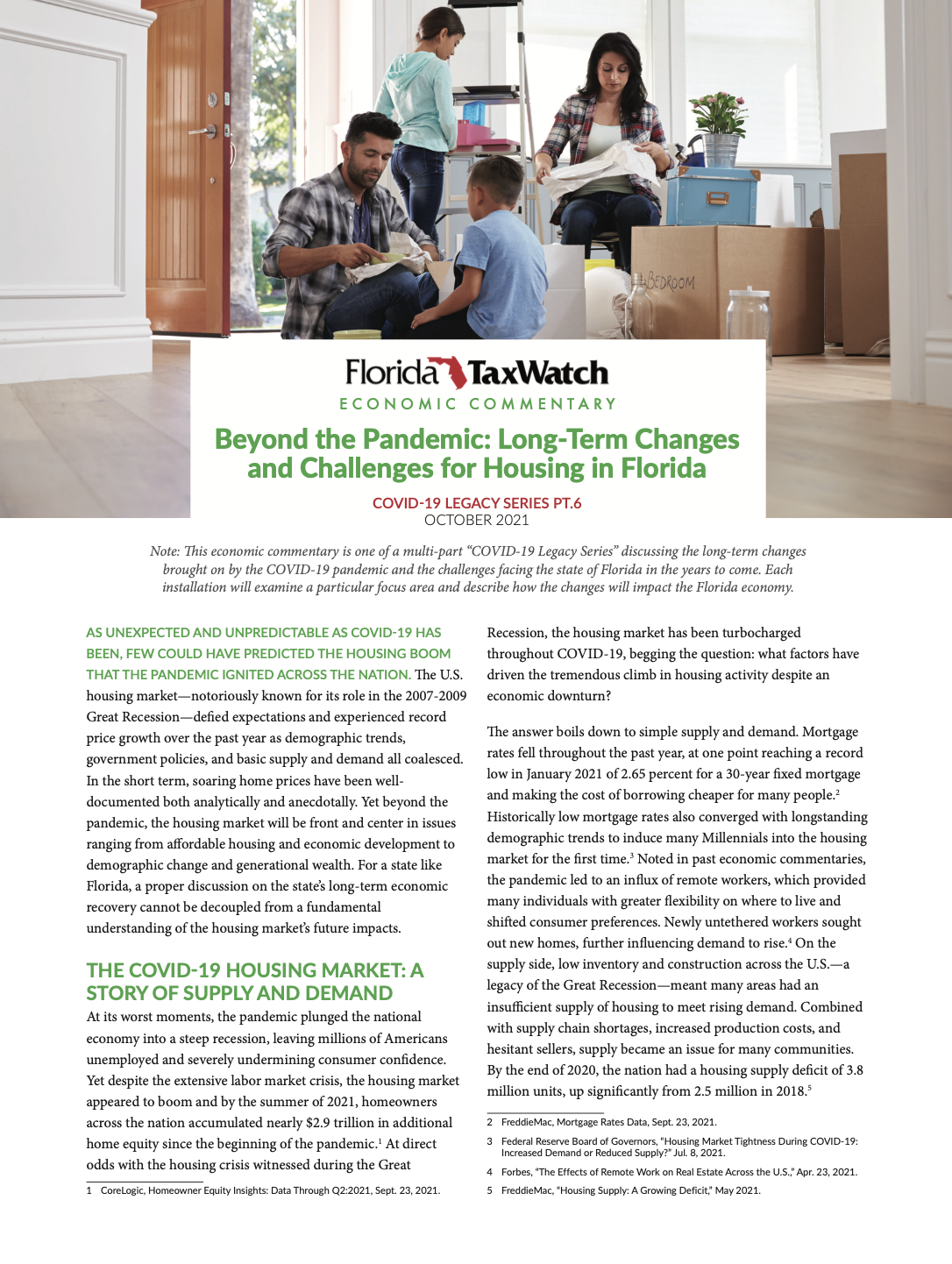Beyond the Pandemic: Long-Term Changes and Challenges for Housing in Florida

As unexpected and unpredictable as COVID-19 has been, few could have predicted the housing boom that the pandemic ignited across the nation. The U.S. housing market—notoriously known for its role in the 2007-2009 Great Recession—defied expectations and experienced record price growth over the past year as demographic trends, government policies, and basic supply and demand all coalesced. In the short term, soaring home prices have been well-documented both analytically and anecdotally. Yet beyond the pandemic, the housing market will be front and center in issues ranging from affordable housing and economic development to demographic change and generational wealth. For a state like Florida, a proper discussion on the state’s long-term economic recovery cannot be decoupled from a fundamental understanding of the housing market’s future impacts.
At its worst moments, the pandemic plunged the national economy into a steep recession, leaving millions of Americans unemployed and severely undermining consumer confidence. Yet despite the extensive labor market crisis, the housing market appeared to boom and by the summer of 2021, homeowners across the nation accumulated nearly $2.9 trillion in additional home equity since the beginning of the pandemic. Considered together, excessive demand and truncated supply caused home prices to soar and competition to be fierce. In many anecdotal examples, prospective buyers have been observed bidding well above the asking price in regionally hot markets across the U.S. and many have even opted to purchase homes without viewing them beforehand.
Florida’s housing market mirrors larger national trends, albeit with some regional variation. An imbalance between demand and supply has fueled rapid home appreciation across the state. In August 2021, the statewide median sales price for single-family homes hovered around $354,000, representing an 18 percent growth from the previous year. If home prices continue to rise at this accelerated rate, projections suggest Florida’s average home price may reach $438,000 by 2030.
Although it is quite difficult to forecast future housing trends (i.e., the experience in 2020 is a testament to this reality), it can be reasonably expected that prices will remain fairly high in the near future. Housing starts are a prime leading economic indicator for signaling future supply. More housing starts usually signal more economic activity on the horizon and reflect growing consumer sentiment. Based on current forecasts, housing starts in Florida will likely peak around 174,000 in 2021 before dropping in the following years to an average of 157,000 new houses in 2023 and beyond (See Figure 1).
Rapidly rising home prices—exacerbated by the pandemic— also have a significant long-term impact on affordable housing16 in Florida. Well-documented in previous Florida TaxWatch research, Florida currently struggles with a lack of affordable housing, which disproportionately impacts vulnerable populations, such as the poor, children, elderly, and persons with disabilities. To be clear, Florida’s affordable housing situation predates the pandemic, but COVID-19 has certainly amplified the issue and future consequences. Many low-income families were disproportionately affected by the pandemic, often facing the brunt of unemployment challenges and experiencing housing insecurity. Healthcare workers faced unprecedented challenges in the workplace, leading to immeasurable emotional and financial strain.
Florida’s housing market has experienced a whirlwind of developments in the past year, facing historic price increases as low supply and high demand permeate the real estate markets. Most attention is focused on the prices and whether a housing bubble is on the horizon. Yet as discussed in this commentary, long-term discussions about the housing market implicate considerations about potential secondary effects. Historically, Florida has often relied on its temperate climate, low tax environment, and natural amenities to attract would-be residents; however, all these alluring factors are blunted if affordable housing issues continue to persist across the state. If Florida is to remain competitive in a post- pandemic world, it must wrestle with the fact that expensive housing can, in some ways, be a hindrance to economic growth with disparate impacts on important subsets of the population.
Documents to download
-
Oct-21-EC(.pdf, 896.11 KB) - 1790 download(s)